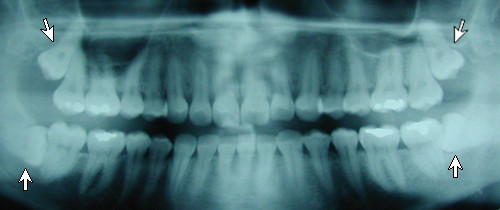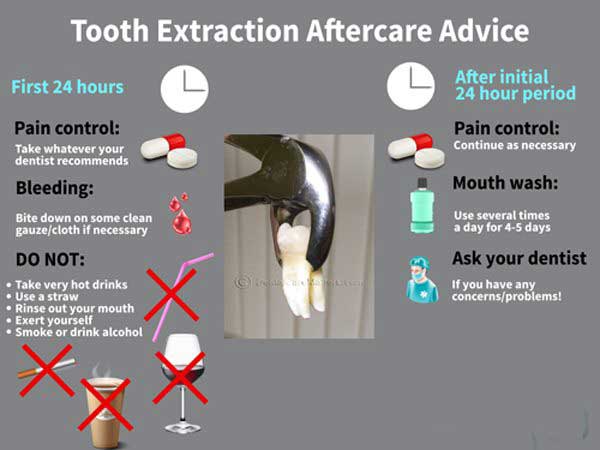Wisdom Tooth Extraction
The procedure is usually done under local anesthesia by an oral and maxillo facial surgeon in the dental clinic under cover of antibiotics and painkillers. To remove the wisdom tooth, the surgeon will open up the gum tissue over the tooth and take out any bone that is covering the tooth. He or she will separate the tissue connecting the tooth to the bone and then remove the tooth. Sometimes the dentist will cut the tooth into smaller pieces to make it easier to remove.After the tooth is removed, you may need stitches. Some stitches dissolve over time and some have to be removed after a few days.

Impacted wisdom teeth (i.e., those that have failed to erupt through the gum line) fall into one of several categories. A wisdom tooth, in humans, is any of the usual four third molars. Wisdom teeth usually appear between the ages of 17 and 25. Most adults have four wisdom teeth, but it is possible to have fewer (hypodontia), or more, in which case they are called supernumerary teeth. Wisdom teeth commonly affect other teeth as they develop, becoming impacted or "coming in sideways." They are often extracted when this occurs. About 35% of the population do not develop wisdom teeth at all.

Wisdom teeth, also known as third molars, are the last teeth to erupt in your mouth. This generally occurs between the ages of 17 and 25, a time of life that has been called the Age of Wisdom.
Anthropologists note that the rough diet of early humans resulted in the excessive wear of their teeth. Normal drifting of the teeth to compensate for this wear ensured that space was available for most wisdom teeth to erupt by adolescence. The modern diet, which is much softer, and the popularity of orthodontic tooth straightening procedures produce a fuller dental arch, which quite commonly doesn’t leave room for the wisdom teeth to erupt, thereby setting the stage for problems when the final four molars enter the mouth.
What is an impacted tooth?
A tooth becomes impacted when there is a lack of space in the dental arch and its growth and eruption are prevented by overlying gum, bone or another tooth. A tooth may be partially impacted, which means a portion of it has broken through the gum, or totally impacted and unable to break through the gum at all.
How serious is an impacted tooth?
Impacted and partially impacted teeth can be painful and lead to infection. They may also crowd or damage adjacent teeth or roots. More serious problems may occur if the sac surrounding the impacted tooth becomes filled with fluid and enlarges to form a cyst. As the cyst grows it may hollow out the jaw and permanently damage adjacent teeth, the surrounding bone and nerves. Rarely, if a cyst is not treated, a tumor may develop from its walls and a more serious surgical procedure may be required to remove it
Must the tooth come out if it hasn’t caused any problems?
Not all problems related to third molars are painful or visible. Damage can occur without your being aware of it. As wisdom teeth grow, their roots become longer, the teeth become more difficult to remove and complications become more likely. In addition, partially or totally impacted wisdom teeth are more likely to cause problems as patients’ age. No one can predict when third molar complications will occur, but when they do, the circumstances can be much more painful and the teeth more difficult to treat. It is estimated that about 85% of third molars will eventually need to be removed.
What happens during surgery?
It is especially important to let the doctor know about any illness you have and medications you are taking. The relative ease with which a wisdom tooth may be removed depends on several conditions, including the position of the tooth and root development. Partially or totally impacted wisdom teeth may require a more involved surgical procedure. Most wisdom tooth extractions are performed under local anesthesia. This will essentially eliminate any pain felt during surgery.
What happens after surgery?
Following surgery, you may experience some swelling and discomfort, which are part of the normal healing process. Cold compresses help decrease the swelling, and medication we prescribe can help manage the discomfort. You should limit your diet to soft foods following surgery and later progress to food that requires more chewing.Prescribed medication should be taken on time.
Tips to help speed your recovery after a tooth extraction.

- Bite gently on the gauze pad periodically. Call your dentist or oral surgeon if you still have bleeding 24 hours after your surgery.
- While your mouth is numb, be careful not to bite the inside of your cheek or lip, or your tongue.
- Do not lie flat. This may prolong bleeding. Prop up your head with pillows.
- Try using an ice pack on the outside of your cheek for the first 24 hours.
- Eat soft foods, like curdrice or a thin soup. Gradually add solid foods to your diet as healing progresses.
- Do not use a straw for the first few days. Sucking on a straw can loosen the blood clot and delay healing.
- After the first day, gently rinse your mouth with warm salt water several times a day to reduce swelling and relieve pain. You can make your own salt water by mixing a pinch of salt in a medium-sized glass of warm water.
- Do not smoke for at least 24 hours after your surgery. The sucking motion can loosen the clot and delay healing. Also, smoking decreases the blood supply and can bring germs and contaminants to the surgery area.
- Avoid rubbing the area with your tongue or touching it with your fingers.
- Continue to brush your teeth and tongue carefully.
- Your dentist will remove the stitches after a few days, if needed.
What To Think About
If your wisdom teeth are not causing problems, it may be difficult to decide whether to have these teeth removed to prevent possible dental problems later in life. Think about the following:
- You may never have any problems with your wisdom teeth.
- It is rarely harmful to your health to have your wisdom teeth removed, but there are slight risks involved with any surgery.
- In younger people (late teens and early 20s), the wisdom tooth's roots are not fully developed and the jaw bone is not as dense, so it is easier to remove the tooth. The easier it is to remove the tooth, the easier your recovery is likely to be.
- Most problems with wisdom teeth develop between the ages of 15 and 25.
- If you are older than age 40, you have only a small risk of having problems with your wisdom teeth. Few people older than 40 develop problems that require removal of their wisdom teeth.
- If you have a medical condition that may get worse over time and your teeth may cause problems, consider having your wisdom teeth removed while you are healthy.
- Possible complications include dry socket (alveolar osteitis), infection, bleeding, and numbness.
- Women on birth control pills who decide to have their wisdom teeth removed should try to schedule the surgery for the end of their menstrual cycle (usually days 23 through 28). There seems to be less risk of dry socket during this time
After a wisdom tooth is removed, you may have or notice:
- Pain and swelling in your gums and tooth socket where the tooth was removed.
- Bleeding that won't stop for about 24 hours.
- Difficulty with or pain from opening your jaw (trismus).
- Slow-healing gums.
- Damage to dental work, such as crowns or bridges, or to roots of a nearby tooth.
- A painful inflammation called dry socket.
- Numbness in your mouth and lips after the local anesthetic wears off, due to injury or inflammation of nerves in the jaw. Numbness will usually go away, but in rare cases it may be permanent.
- Dental surgery may cause bacteria in the mouth to enter the bloodstream and cause infections in other parts of the body. People who have difficulty fighting off infections may need to take antibiotics before and after dental surgery. Such people include those who have artificial heart valves or were born with heart defects.